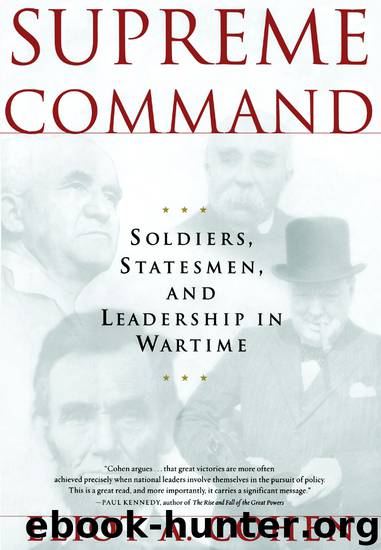Supreme Command by Eliot A. Cohen

Author:Eliot A. Cohen
Language: eng
Format: epub
Publisher: Free Press
“THEY DON’T HAVE REAL MILITARY EXPERIENCE, AND THEY DON’T WANT IT.”
Shortly after the event, Ben-Gurion described to colleagues his assessment of June 1947: “[Here are] the faults I found: lack of equipment; for years no adequate thought about the needs of security and the Arab danger; the “Organization” sees itself as an end and not a means (the task for which it was created was not sufficiently in the forefront of their minds); the Haganah has a corporate spirit; they don’t have real military experience, and they don’t want it.”25 In the meanwhile, events had continued to move. In the winter of 1946–47 the British authorities concocted a proposal for dividing Palestine into Jewish and Arab zones, supervised by a lingering British presence. Formally offered in February 1947, the proposal encountered stout opposition by all concerned, and it collapsed. In April 1947, in the midst of the Seminar, the British government referred the problem of Palestine to the United Nations. By the summer of 1947 it was clear that the climactic struggle was at hand: Ben-Gurion, above all, recognized that a UN vote for partition of Palestine would almost immediately unleash a war. In November of that year the Security Council did indeed vote in favor of partitioning Palestine into two independent states, one Arab and one Jewish.
Anticipating these events, and immediately following the Seminar, Ben-Gurion embarked upon three broad policies. He began by overhauling the high command of the Haganah. In addition to replacing the ineffectual chief of the National Command, Ze’ev Feinstein, with Israel Galili, he made changes in the military command as well.26 He did not replace Ya’akov Dori, who had served since 1939 as the Haganah’s chief of staff, but he did install the youthful Yigal Yadin as chief of the operations branch. This was, as yet, a provisional change: more would come later on, but for the moment he wanted at the head of the Haganah men who would not challenge his authority and who shared his view that the organization was inadequate and complacent. Ben-Gurion remarked in October 1947 that the most serious problem he faced was “a lack of civilian control of the Organization [the Haganah]. Civilian control of the Organization was,” he declared, “without a doubt, fictitious.”27 His selection of new leaders for the Haganah already reflected his intention to assert civilian control: neither Dori nor Yadin had independent followings in the Haganah. The former had served in the Haganah for many years and was an engineer by training and outlook; ailing, he did not dominate a military staff. Yadin, the younger man, was a member neither of the Palmach nor of the old Haganah establishment, having taken a leave from the organization for a year and a half until the spring of 1947.28 The son of a self-trained archaeologist, Yadin prided himself on his military professionalism although he had never served in the British Army. Well read in military theory, he had played an important role in the creation of the
Download
This site does not store any files on its server. We only index and link to content provided by other sites. Please contact the content providers to delete copyright contents if any and email us, we'll remove relevant links or contents immediately.
| Anthropology | Archaeology |
| Philosophy | Politics & Government |
| Social Sciences | Sociology |
| Women's Studies |
The Secret History by Donna Tartt(18994)
The Social Justice Warrior Handbook by Lisa De Pasquale(12175)
Thirteen Reasons Why by Jay Asher(8870)
This Is How You Lose Her by Junot Diaz(6854)
Weapons of Math Destruction by Cathy O'Neil(6243)
Zero to One by Peter Thiel(5760)
Beartown by Fredrik Backman(5706)
The Myth of the Strong Leader by Archie Brown(5479)
The Fire Next Time by James Baldwin(5408)
How Democracies Die by Steven Levitsky & Daniel Ziblatt(5197)
Promise Me, Dad by Joe Biden(5127)
Stone's Rules by Roger Stone(5065)
A Higher Loyalty: Truth, Lies, and Leadership by James Comey(4937)
100 Deadly Skills by Clint Emerson(4898)
Rise and Kill First by Ronen Bergman(4757)
Secrecy World by Jake Bernstein(4724)
The David Icke Guide to the Global Conspiracy (and how to end it) by David Icke(4679)
The Farm by Tom Rob Smith(4484)
The Doomsday Machine by Daniel Ellsberg(4472)
